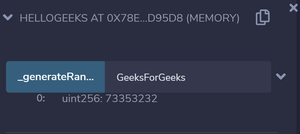加密哈希函数是一种算法,它以任意数量的数据作为输入并生成固定大小的加密文本。即使输入的微小变化也会产生完全不同的输出。
Solidity 提供以下加密功能:
| 功能 |
特性 |
|---|---|
| keccak256(bytes memory) 返回 (bytes32) | 计算输入的 Keccak-256 哈希 |
| sha256(bytes memory) 返回 (bytes32) | 计算输入的 SHA-256 哈希 |
| ripemd160(bytes memory) 返回 (bytes20) | 计算输入的 RIPEMD-160 哈希 |
| sha256(bytes memory) 返回 (bytes32) | 计算输入的 SHA-256 哈希 |
| ecrecover(bytes32 hash, uint8 v, bytes32 r, bytes32 s) 返回(地址) | 从用于加密的椭圆曲线签名 中恢复与公钥关联的地址, 如果发生错误则返回零。这些参数对应于 ECDSA 签名值。 |
以太坊使用 Keccak 进行散列,这与 SHA_256 相似但不同。对于工作量证明,它使用了一种名为ethash的自定义方案,该方案旨在抗 ASIC。
示例:在下面的示例
// pragma version
pragma solidity ^0.6.6;
// Creating a contract
contract helloGeeks
{
// We want hash to be of 8 digits
// hence we store 10^8 which is
// used to extract first 8 digits
// later by Modulus
uint hashDigits = 8;
// Equivalent to 10^8 = 8
uint hashModulus = 10 ** hashDigits;
// Function to generate the hash value
function _generateRandom(string memory _str)
public view returns (uint)
{
// "packing" the string into bytes and
// then applying the hash function.
// This is then typecasted into uint.
uint random =
uint(keccak256(abi.encodePacked(_str)));
// Returning the generated hash value
return random % hashModulus;
}
}
中,创建了一个智能合约以将字符串作为输入并给出 8 位哈希作为输出。
输入:
极客换极客
输出:
